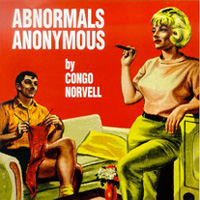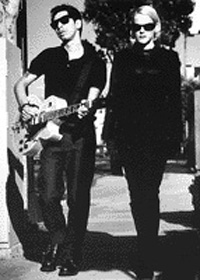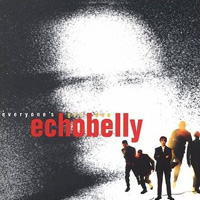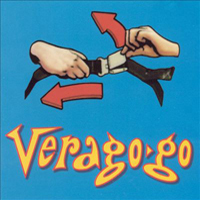 Congo Norvell
Congo Norvell
Abnormals Anonymous (Jetset)
An interview with Kid Congo Powers and Sally Norvell
by Nik Rainey
I won’t bother you with any more mewling praise about the latest Congo Norvell CD, Abnormals Anonymous – you can drop three bucks on the December issue if it’s that important to you – other than to say that it’s a great step forward from their previous album, The Dope, the Lies, the Vaseline, in part because it’s a more assured piece of dark blues-noir, and in part because, unlike the former album, it’s actually been released. The principals in this ongoing exploration of bleak romanticism and aural melodrama – Kid Congo Powers, former guitarist for the Cramps, Gun Club, and Nick Cave and the Bad Seeds, and Sally Norvell, a cool chanteuse with genuine celluloid experience under her belt – bring a needed shot of unprepossessing smarts to the otherwise shot vein of brutally melancholic music (and having existential moper supreme Mark Eitzel guest star on several tracks only helps matters), and in person, they’re every bit the same. Check it:
So what happened to your last album? The advance copies went out and reviews got written, but it was never officially released?
Kid Congo Powers: Well, the label, Priority Records – oh, Sally’s rolling her eyes, she must have overheard me (laughs) – was basically a boutique label, and at the last minute they decided they didn’t like the dresses in their boutique and tore them up without telling anyone and wouldn’t even give us the shredded-up pieces.
Hopefully, Jetset’s a nicer shop. A little smaller, maybe, but they seem to care a little more about their inventory.
Yeah. It’s funny, it looks like a lot of bands are leaving the majors and going back to indies and are a lot happier for it. No more baking your cake and not being able to eat it. Jetset’s a lot nicer because it’s more like a family rather than a corporation – there are people there who are actually into the music and are willing to talk to you, which is a nice change for me.
Have you dealt with that a lot over the years? You’ve played in some pretty daring bands…
With the Gun Club, it happened a lot. Nick and the Cramps were a lot more bullheaded about things being done their way, which is really how we’ve been – it was just a chance we took, to see what would happen if we let it out of our hands a little bit, and well…(laughs) Learned our lesson there!
You take some interesting avenues on this record, like “Johnny in the Boudoir,” which is a much different-sounding tune than most people would expect from you. How did that come about?
One of the traits that Sally and I share when it comes to this band is to allow ourselves to be creatures of whim when we want to be. That was a band composition – I came in with certain chords and the idea that it’d be another gospelly, dirgy, “Bringing in the Sheaves” sort of thing, and obviously it didn’t quite come out that way. Sally’s lyrics, especially, brought out the urgency in that song. I’m no stranger to pop music – I like songs like that.
 How about Mark Eitzel? How’d you snag him for the record?
How about Mark Eitzel? How’d you snag him for the record?
Paid him a whole lot of money. We spent the whole budget just to get Mark to set foot in the studio… no, Mark is a good friend of ours. I played on his album, the one that’s out in January on Matador; he was living out here (New York) for a while, he’d come over every night and we’d get horrifically drunk together. We’re very like-minded about what we do… and what we drink (laughs)! It was a very natural thing. On something like “She’s Like Heroin to Me,” that Lee-and-Nancy thing that he and Sally have makes that song more poignant. Especially as it’s something of a tribute to Jeffrey (Lee Pierce), it fits well.
There’s a definite noir aspect to the words. Very cinematic.
We love films that deal with the psychological view of peoples’ emotions, people like Cassavettes and Polanski or someone that takes a closeup view of the psychosexual implications of what people do, rather than some pat love story. We’re especially interested in the point, in any kind of relationship, where things change. At what point do peoples’ reactions take them somewhere different than the place that they’re accustomed to? Usually someplace inappropriate (laughs).
Your previous bands have all had very intense, upfront, male frontmen – how is the dynamic with Sally, who seems much cooler than Lux or Nick or Jeffrey, different for you?
I think that the female element is a good aspect to have, having a female diva rather than… a male diva (laughs). Really, I don’t think it’s that different, because I like a singer who can interpret things their own way. Different records can do that too – it depends on what I’m listening to at the time. I’ve been going through this major Leonard Cohen phase, listening to a lot of older Leonard Cohen. Like Death of a Ladies’ Man, which is quite a funny, weird record- that’s the one Phil Spector produced and the lyrics are so incongruous with the music, which renders it almost like black comedy – you’ll be like, “Oh, God, that’s awful!” but you’ll be laughing at it. That had a big effect on the kind of album we were going for. That and a lot of old soul music – I listen to, say, Ike & Tina Turner’s stuff, and realize how over the top it is. You know, how Ike would write songs like “I Idolize You” and make Tina sing them with a gun to her head! And my other favorite is Smokey Robinson, whose lyrics about love and life are totally believable and very reflective of what was going on with Black people at the time – that makes me try to make it my equivalent of our generation, now, and my situation – whatever the fuck I am. A Mexican, homosexual, rock `n’ roll freak – you know, the modern equivalent. (laughs)
Sally Norvell: Don’t tell your wife about that. Or your boyfriend.
Kid Congo: I just wouldn’t want to be in a band that does the same thing all the time. For example, I love Nick’s new album, because it’s very personal when everyone was expecting him to do another Murder Ballads, even though many reviewers hated it – “What the hell is this? He doesn’t kill anybody in these songs!” But I prefer expansion to implosion. I wouldn’t have it another way.
Now Sally, your background is more in film than in music, is that right?
I have a grounding in both, and I could never make up my mind between the two, so I keep bouncing from one to the other. As it happens, they do overlap in a good way and I can meld the two. I do a lot of line producing for music videos, I also make short films and have a couple of feature projects in the works. I hope to get into music supervision as well, compiling soundtrack albums and that kind of thing. It’s a very lively thing to do in New York, there’s a lot of great indie film folks here that are doing very interesting things, as opposed to the machine over there in Hollywood. But I like to work, I like to produce and see things get made, whether or not they actually get distributed, darling (laughs). I’m just a multi-media micro-mogulist.
Your expertise shows, too. Not many people reference Douglas Sirk titles in their lyrics…
I’m a big Douglas Sirk fan. And Lana Turner, of course. I was watching Magnificent Obsession last night – that was a classic. Sirk’s an unsung hero of mine – his movies are on TV all the time and people still don’t seem to know who he is. They just think they’re glossy, corny fifties melodramas, but they have such a great subtext of hardcore cynicism and black-heartedness that’s so awesome! He was definitely one of the masters of subverting the system – making films in Hollywood that were considered mainstream but still throwing a wrench in the works, I think that’s important. True poetry, like what the Europeans do, is very valuable but would just get eaten alive in Hollywood today.
Any recent films that have struck your fancy?
L.A. Confidential, definitely. It’s great to see that odd Australian influence in that movie that you might not recognize unless you know the back story. I’ve always had an affinity for the Australian way of looking at things. Maybe that’s because I’m from Texas – you know, the trailer-park undesirables that got thrown out of the motherland. I don’t like a lot of modern movies; same goes for music. But I think that’s always held true, that the good stuff will rise to the top and will last and the rest will not. I’m actually watching American Gigolo and it looks pretty good! It looks a lot better now than it did then, probably because we’re out of the eighties – I don’t know about you, but I was definitely trying to escape it. I was living in the pop heart of Hollywood at the time, and it was hard to get away. Now that I’m gone, it looks a lot better. And of course, now that we know what we know about Richard Gere…
Yeah, I believe there’s a gerbil scene in the director’s cut.
Definitely, definitely. (The tape ends at this point, and while turning it over, we go into a detailed comparison of our favorite Nicolas Roeg movies. For the record, Sally favors Eureka and I’m a Performance man.)
What about favorite writers?
Paul Bowles was always a fave of mine, Robertson Davies, Gabriel Garcia Marquez was probably my first big influence as far as the free use of imagery, Faulkner, Fitzgerald, some of the Southern writers… but as far as influence, it’s hard to say. I like to get into sort of an altered state – I like to write when I’m really tired, right when I wake up or before I go to sleep is when things tend to bubble up. I do a lot of journal writing that sometimes gets cut and pasted into two or three different songs. As far as influences, it’s just good to be influnced by stuff, stuff that feeds the head like going to the museum or the challenging film rather than the popcorn film, even if you’re not in the mood – it gets filed away, and you can use it later.



